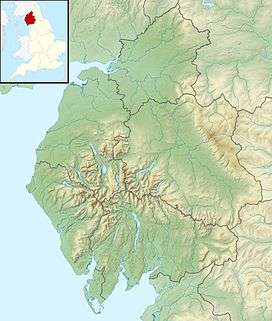River Derwent, Cumbria
The Derwent is a river in the county of Cumbria in the north of England; it rises in the Lake District and flows northwards through two of its principal lakes, before turning sharply westward to enter the Irish Sea at Workington The name Derwent is shared with three other English rivers and is thought to be derived from a Celtic word for "oak trees"[1] (an alternative is dour water and (g)-went white / pure ).[2]
| River Derwent | |
|---|---|
 Derwent at Grange Bridge | |
 Location of the mouth within Cumbria | |
| Location | |
| Country | United Kingdom |
| Country within the UK | England |
| Counties | Cumbria |
| Physical characteristics | |
| Source | Styhead Tarn |
| Mouth | |
⁃ location | Irish Sea at Workington |
⁃ coordinates | 54°38′58″N 3°34′8″W |
| Discharge | |
| ⁃ location | Workington |
| Basin features | |
| Tributaries | |
| ⁃ left | River Cocker, River Marron |
| ⁃ right | River Greta |
The river rises at Sprinkling Tarn underneath Scafell Pike and flows in a northerly direction through the valley of Borrowdale, before entering Derwentwater, which it exits to the north just outside Keswick and is joined by the waters of the River Greta. The Derwent then enters Bassenthwaite Lake at its southern end; it exits it at its northern end, thereafter flowing generally westward to Cockermouth, where the River Cocker joins it from the south. (William Wordsworth's childhood home in Cockermouth backed onto the Derwent, and he briefly mentions it in The Prelude:
... the bright blue river passed
along the terrace of our childhood walk;
A tempting playmate whom we dearly loved)[3]
From Cockermouth, the river continues westward past Papcastle, site of the Roman fort of Derventio (The Roman fort and settlement at Malton on the Yorkshire Derwent was also Derventio, as was a fort and settlement on the Derbyshire Derwent at Little Chester.) and onwards to Workington, where it flows into the Irish Sea.
See also
- List of rivers of England
- November 2009 Great Britain and Ireland floods
References
- David Mills (20 October 2011). A Dictionary of British Place-Names. OUP Oxford. p. 152. ISBN 978-0-19-960908-6.
- See under ; DUR ' http://freepages.genealogy.rootsweb.ancestry.com/~pbtyc/Misc/Etymology.html
- Wordsworth, William. 1888. Complete Poetical Works. Bartleby.com. Retrieved on 2014-04-12.